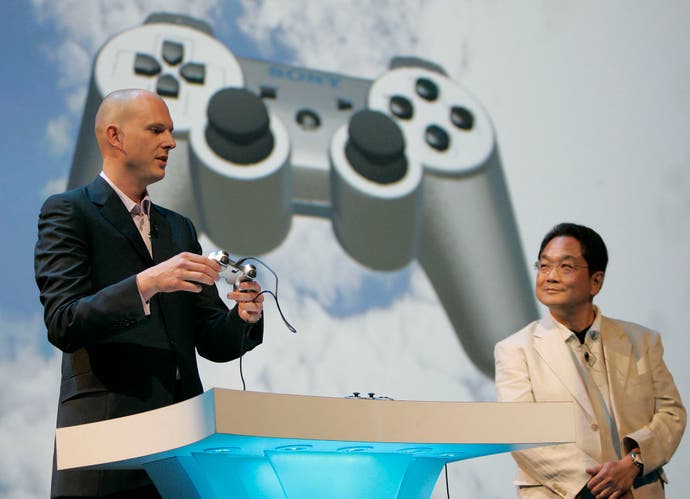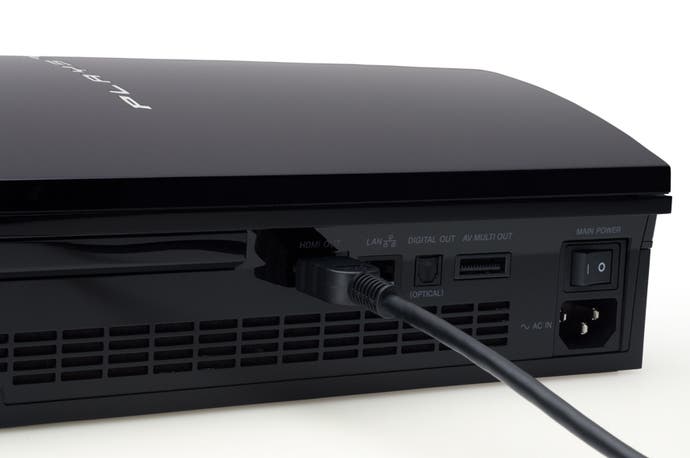Farewell, Father
Charting the rise and fall of Ken Kutaragi.
The Engineer's Dilemma
Nobuyuki Idei was about as far from Norio Ohga as you could imagine from a CEO. He was the first CEO of Sony not to come from engineering stock, and it showed. His appointment was hugely controversial within Sony, but considered to be a measured success within the business community - he was ruthless in his reforms at the firm, and started to turn around the internal perception that Sony should be engineering-led and focus on the company's profitable but underfunded content businesses.
When Ohga left Idei in charge, he told his successor to trust Kutaragi - and initially, Idei did exactly that. Kutaragi continued to be given a free hand at SCEI, and while Idei made sweeping changes to the rest of Sony, his reforms barely touched the hugely profitable videogames division.
Meanwhile, Kutaragi started planning bigger and bigger things for SCEI. His vision for videogames now saw the games console sitting at the heart of the living room, as the key entertainment device for a digital future. It's a vision which he had nursed since before the launch of the original PlayStation, and one which was shared by rivals at Microsoft, who were pouring money into their own game console project in a desperate attempt to head off Sony's efforts at controlling the living room via the PlayStation.
It's not really clear when, or why, Idei decided he didn't trust the Father of PlayStation. In some respects, it was probably down to the traditional schism between businessmen and engineers; Idei being the former, and Kutaragi the latter, the two men would have had radically different views on how Sony should be run. Kutaragi's outspoken and undiplomatic manner would almost certainly have rubbed the reserved Idei up the wrong way entirely, and seemed merely arrogant where to his predecessor, Ohga, it seemed like a breath of fresh air in a company suffocating under double-talk and politeness.
It can't have helped that this was around the time when Kutaragi started to earn his reputation as "Crazy Ken". His personality, which was given to brash pronouncements and hyperbole, had made him unpopular with many people at Sony from the outset of his career - but now, this controversial figure was also the most senior spokesperson for PlayStation. Few gamers who were around at the time of the PS2 launch will have forgotten his amazing comments about the ludicrously named Emotion Engine CPU, or his claim that the console would be like "jacking in to the Matrix".

SCEI couldn't very well hide away its own boss, despite his tendency to make outrageous statements - but at the time, it didn't matter very much anyway. The PlayStation and its successor were so wildly successful that Kutaragi's excessively effusive nature almost looked playful, and it's arguable whether his hyperbole did any damage to the brand. Success forgives many failings. However, what's not known is how this was received within Sony itself. With the benefit of hindsight, it seems almost certain that Kutaragi's newfound public persona did little to endear him to Sony's senior management, and specifically to Nobuyuki Idei.
At this time, it was widely expected that Kutaragi would succeed Idei when he resigned. There was simply nobody else in the frame for the role, and SCEI continued to march solidly onwards; even the launch of rival consoles from Microsoft and Nintendo seemed to be doing nothing to slow down the growth of Sony's astonishing games business. However, Idei made a surprising decision; he announced that he would be remaining at Sony for two years longer than originally planned, so that he could be at the firm for its 60th anniversary.
It was a somewhat weak excuse from a man who wasn't noted for being particularly sentimental about such occasions - especially not compared to the firm's previous engineer-CEOs, who had lived and breathed Sony all their lives. Within the company, the rumours about Idei's real intent were all focused on one thing, and Sony insiders are all fairly clear on why they think Idei hung around for longer than expected. Idei had trusted Kutaragi, as Ohga had instructed him, but he no longer thought that Kutaragi would be able to lead Sony effectively. Instead, he believed that his last task at Sony should be to ensure that Kutaragi did not succeed him.
Falling Star
To an external observer, however, Kutaragi's star was still rising - and shining brighter than ever. In 2003, in fact, Idei promoted him to a vastly senior role within Sony Corporation, making him into Deputy Executive President, Chief Operating Officer, and Vice-Chairman. No longer merely in charge of the videogames division, Kutaragi had - it seemed - been rewarded for his success with control over Sony's entire consumer electronics division. He was, the business community reasoned, now clearly in line to succeed Idei.
Moreover, he was now free to apply his ideas to turning around Sony's fortunes in the consumer electronics market. This, however, was the catch. Sony had been losing ground for some time in this area, and was faced with tough competition from rivals such as Korean firm Samsung, which was pulling ahead of Sony in the LCD market. Moreover, Kutaragi was deeply unpopular in parts of the consumer electronics division, having openly criticised the division's failure to compete effectively with Apple's iPod in the media.
In other words, Idei set up Kutaragi to fail - and fail he did. In a year and a half at the helm of consumer electronics, his efforts did little to improve the division's position in the market. He relied on engineering solutions to problems, and believed that developing superior technology was the key to beating the firm's competitors. In pursuit of that, he ruthlessly pruned away anything which he saw as a barrier to engineering flair - essentially removing the sort of managers he himself had butted heads with as a young engineer, but this time, from a position of absolute power.

The problem was that Sony's technology was already good - it was being outmanoeuvred not on engineering, but on innovation. It had missed the iPod revolution entirely, with the bitter irony being that the iPod was not actually a cutting edge piece of hardware. In fact, it was a device which followed Nintendo's old philosophy of "lateral thinking with withered technology" - the very philosophy which Kutaragi himself had shunned from the inception of SCEI.
Kutaragi's efforts were failing, and moreover, they were creating massive rifts in the electronics group - where he proved to be a controversial and divisive figure. His combative strategy, which had worked so well as an underdog, simply lost him friends as a senior executive. With Ohga gone, Kutaragi found himself exactly where Idei wanted him - completely out on a limb, with his only support coming from Idei himself.
Given enough rope to hang himself, Kutaragi had just managed to prove to Sony's top executives and board members that he wasn't the man for the top job. In his place, Sony took the extraordinary step of appointing its first non-Japanese boss - Welshman Howard Stringer. While Kutaragi had struggled with the poisoned chalice of the home electronics business, Stringer had been excelling as the head of the Sony BMG content business. Idei positioned him as an ideal candidate, replacing him as the favourite in the race to the top - and Kutaragi's ambitions of ever leading Sony died.
When Idei retired in 2005, Stringer took the reins - and Kutaragi lost his seat on the board and control of the home electronics and semiconductor divisions. He returned to his position at the head of SCEI, focusing on the launch of the vastly delayed and over-budget PlayStation 3 - but despite the end of his ambitions to lead Sony, Kutaragi's fall from grace was far from over.
